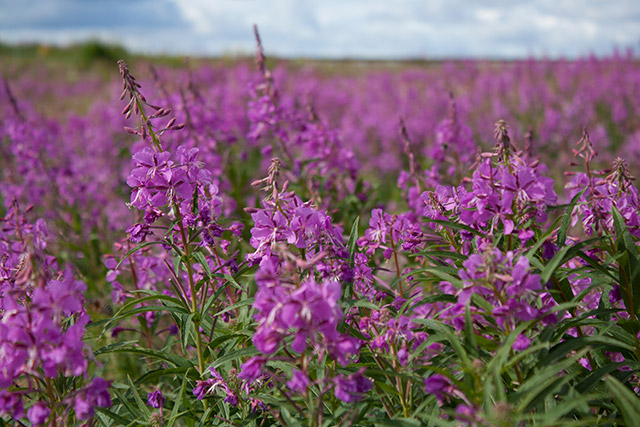Pick of the Season: Fireweed jelly
Wapusk National Park
Northern Manitoba bursts with flowers, berries, and leaves to provide for both wildlife and people. “Pick of the Season” is a series that highlights what to harvest and how to use it. In this post, the focus is on fireweed.

Fireweed’s elongated clusters of vibrant purple flowers can be found across Churchill’s tundra, flanking the wooden boardwalks leading to Prince of Wales Fort National Historic Site, or as one of the 700+ species of plants in Wapusk National Park.
Known for its anti-inflammatory properties, fireweed’s modern-day use leans towards cosmetics, but Indigenous communities have long been serving it up as a raw or cooked vegetable. Heather Spence-Botelho, Knowledge Weaver with Parks Canada, uses a family recipe to turn it into something a little sweeter:
Fireweed jelly
Step #1 – Gather
- Gather up to at least 8 cups of fireweed blossoms[1] (late August is best).
- Allow blossoms to sit; the bees, wasps, and caterpillars will come to the top. Release them.
Step # 2 - Make Fireweed Tea
- Fill a large soup pot with blossoms and add about 3-4 cups of water. Bring to a boil until blooms lose their purple colour.
- You MAY add water as needed (add a 1/2 cup at a time). You don’t want watery tea; you want a nice rich purple. I usually add a total of about 5 cups of water.
- Strain the liquid into another pot or bowl using a strainer with cheesecloth.
- Ring out all the tea. Toss the boiled blooms. You should have roughly 3 cups of fireweed tea.
Step #3 - Jelly Prep
- Sanitize all your jars, lids, etc. by boiling. While your jars are heating up.
- In the same large soup pot you made your tea in follow this recipe:
- 3 cups of fireweed tea
- 1 tbsp of butter
- 1 pkg (57g) of powdered Pectin
- 1/4 cup of lemon juice
- Heat to a rolling boil, whisking/stirring frequently. Boil for 1 minute.
- Remove from heat.
Step #4 – Fill Jars
- Funnel jelly into jars, leaving 1/4 inch from the top.
- Place a lid on each jar and tighten. Do not overtighten or leave too loose.
- Put jars back in the canning pot and boil jars for 10 mins. Turn off the heat. Let sit for 5 mins.
- Remove jars onto the tablecloth and listen for the seal (lid pops inwards).
- Let sit overnight (and tell anyone tempted not to open it)
Serve the jelly with bannock (see recipe below).
Bannock by the Bay
Family recipe from Heather Spence-Botelho
Ingredients:
- 4 cups of all-purpose flour
- 2 Tablespoons of baking powder
- 1 teaspoon of salt
- 2/3 cup of vegetable oil
- 2 ¼ cups of milk or water
Method:
- Pre-heat over to 400 degrees
- In a large bowl, add all the dry ingredients and mix
- Add oil and milk/water. Mix until blended
- Grease a 9 x 13 pan, bottom only
- Flatten the dough into the pan, poke with a fork
- Bake for 30 minutes. Let it cool for 20 minutes.
Best served warm with butter and/or jam.
Depending on the season and family cravings, you can squish blueberries or cranberries onto the top of your bannock once it’s in the pan, or fold into your wet ingredients.
Want more recipes from the land? Check out the previous Pick of the Season post on Labrador Tea.
Heather Spence-Botelho was born and raised in Churchill, Manitoba. Her maternal grandparents are both Dene and Cree from the traditional territories in and around Churchill. Heather is a member of the Fox Lake Cree Nation band. She loves the outdoors, and cultural traditions are important to her.
Related links
- Day in the Life – Cracking the code with eDNA
- Environmental DNA helping Parks Canada establish...
- Love, Loss, and Raptors
- A Day in the Life – Goose Banding
- Pick of the Season: Blueberry Jam
- Pick of the Season: Cranberries
- Churchill is the Greatest: 3 more reasons Time Magazine was...
- Cape Churchill Caribou Scat Collection
- Pick of the Season: Labrador Tea
- Pick of the Season: Snow goose
- Join the Pod: 5 facts about beluga whales in Manitoba
- She can dig it: Cultural Resource Management Advisor Sandra...
- Date modified :